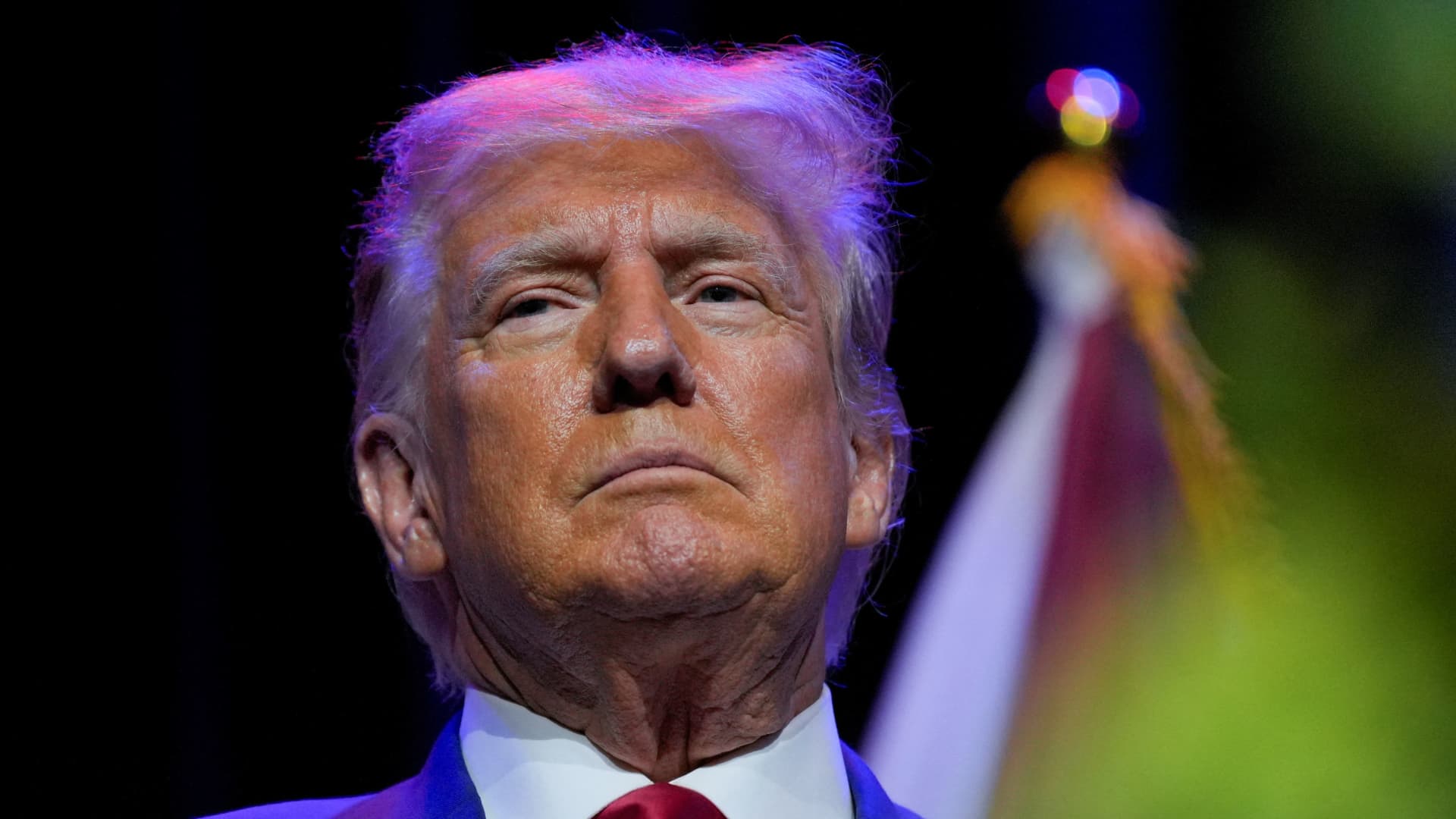When it comes to Donald Trump, there's always something brewing in the news. Lately, whispers about his health—specifically, Trump jaundice—have been floating around like gossip at a high school cafeteria. But what’s the deal? Is it legit or just another media frenzy trying to grab eyeballs? Let’s break it down.
Jaundice, a condition where the skin and eyes turn yellow due to elevated bilirubin levels, has become a buzzword in Trump-related discussions. While jaundice itself isn’t exactly a walk in the park, its connection to Trump raises more questions than answers. Is this a genuine concern or just another political talking point? Stick around, because we’re about to unpack the facts.
As with anything involving the former president, the line between fact and fiction can get blurry. But here’s the thing: health issues don’t care about politics or press conferences. So, let’s dive into the details and separate the wheat from the chaff—or in this case, the truth from the rumors.
- Kannada Cinema 2025 New Releases Movierulz Legal Options
- Filmyfly Your Guide To Latest Movie Updates Reviews More
What Exactly is Jaundice Anyway?
Before we jump into the specifics of Trump jaundice, let’s talk about jaundice itself. It’s not just some random condition that happens out of nowhere; it’s usually a symptom of an underlying issue. Think of it like your car's check engine light—it’s telling you something’s up under the hood.
Jaundice occurs when bilirubin, a byproduct of red blood cell breakdown, builds up in the body. Normally, the liver processes bilirubin and gets rid of it through bile. But if the liver isn’t functioning properly, bilirubin accumulates, leading to that telltale yellow tint. Fun fact: bilirubin is what makes bruises turn yellow as they heal.
Now, here’s the kicker—jaundice can stem from a variety of causes, ranging from harmless newborn jaundice to more serious conditions like liver disease or pancreatic cancer. So, when someone mentions jaundice in connection with a public figure, it’s worth paying attention.
- Unlock Math With A Free Online Graphing Calculator Today
- Mia Z Girthmaster Their Story Impact Complete Guide
Common Causes of Jaundice
Let’s break it down into bite-sized chunks:
- Liver diseases such as hepatitis or cirrhosis
- Blocked bile ducts caused by gallstones or tumors
- Pancreatic issues, including cancer or inflammation
- Genetic disorders like Gilbert’s syndrome
- Hemolytic anemia, where red blood cells break down too quickly
See? It’s not just one thing—it’s a whole spectrum of possibilities. And when you’re talking about someone as high-profile as Trump, the stakes are higher. People want answers, but the truth often lies somewhere in the middle.
Trump Jaundice: Separating Fact from Fiction
Alright, let’s get to the juicy part. Has Trump actually been diagnosed with jaundice? Or is this just another case of tabloid sensationalism? The short answer? We don’t know for sure. But that doesn’t mean we can’t dig deeper.
Trump’s health has always been a hot topic, and for good reason. During his presidency, his annual physicals were closely scrutinized, with critics pointing out everything from his weight to his cholesterol levels. But jaundice? That’s a new one. Or is it?
Some observers have noted a slight yellowing of Trump’s skin over the years, sparking speculation about potential liver issues. Others dismiss it as nothing more than a tan or lighting effects in photos. So, who’s right? Let’s explore the evidence—or lack thereof.
The Evidence (Or Lack Thereof)
Here’s the thing: jaundice isn’t something you can fake. If someone has it, it’s usually pretty obvious. But without medical records or a doctor’s statement, it’s all just conjecture. And let’s be real—Trump isn’t exactly known for sharing his medical files with the world.
What we do know is that Trump has a history of certain health conditions, including high cholesterol and obesity, both of which can contribute to liver problems. Add in his love for fast food and you’ve got a recipe for potential complications. But again, correlation doesn’t equal causation.
Why Does Trump Jaundice Matter?
Here’s where things get interesting. When you’re talking about a public figure, especially one as polarizing as Trump, health issues take on a whole new level of significance. Why? Because it’s not just about him—it’s about the implications for his role in public life.
If Trump were to develop jaundice—or any other serious health condition—it could impact his ability to function as a leader, whether in politics or business. And let’s face it, the guy’s still a major player on the world stage. So, yeah, people are gonna care.
But here’s the thing: health is a private matter. While the public has a right to know if a leader’s health could affect their duties, there’s also a line between transparency and invasion of privacy. It’s a balancing act, and one that’s not always easy to navigate.
The Bigger Picture
Trump jaundice isn’t just about one person—it’s about the broader conversation around health and leadership. How much should we know? How much should we care? And where do we draw the line between curiosity and voyeurism?
It’s a tricky question, and one that doesn’t have a simple answer. But as long as Trump remains in the spotlight, these kinds of discussions are bound to continue.
Trump’s Health History: A Quick Recap
Before we dive deeper into the jaundice rumors, let’s take a quick look at Trump’s health history. It’s not exactly spotless, but it’s also not the end of the world. Here’s a rundown:
- High cholesterol levels
- Obesity
- History of heartburn and acid reflux
- Prescribed medications for various conditions
None of these are dealbreakers, but they do paint a picture of someone who could be at higher risk for certain health issues. And when you throw jaundice into the mix, it’s easy to see why people are talking.
Could Jaundice Be Linked to Other Conditions?
It’s entirely possible. As we mentioned earlier, jaundice is often a symptom of an underlying issue. Could Trump’s jaundice—if it exists—be linked to his cholesterol or liver health? Maybe. But without more information, it’s all just speculation.
What we do know is that maintaining good liver health is crucial, especially for someone with a history of high cholesterol and obesity. So, whether or not jaundice is in the picture, it’s something worth keeping an eye on.
Expert Opinions: What the Doctors Say
When it comes to health, it’s always a good idea to listen to the experts. So, what do doctors have to say about Trump jaundice? Well, opinions vary, but most agree that without concrete evidence, it’s impossible to draw any definitive conclusions.
Some medical professionals point out that jaundice isn’t something that develops overnight—it’s usually the result of a gradual process. Others note that certain medications or supplements can cause temporary yellowing of the skin, which might explain some of the observations.
But here’s the bottom line: until we have actual medical data, it’s all just guesswork. And in the world of health, guesswork isn’t good enough.
Why Trust Matters in Medical Discussions
Trust is everything in medicine. When you’re dealing with someone as high-profile as Trump, it’s important to rely on credible sources and avoid jumping to conclusions based on hearsay or speculation. That’s why expert opinions matter—they provide context and clarity in a world full of noise.
So, the next time you see a headline about Trump jaundice, take a step back and ask yourself: Is this coming from a reliable source? Or is it just another clickbait attempt to grab attention?
How to Spot Jaundice: Signs and Symptoms
Now, let’s get practical. If you’re worried about jaundice—whether for yourself or someone else—here’s what to look out for:
- Yellowing of the skin and eyes
- Dark urine
- Pale stools
- Abdominal pain or discomfort
- Fatigue or weakness
Keep in mind that these symptoms can vary depending on the underlying cause. And while jaundice itself isn’t contagious, the conditions that cause it can be serious if left untreated.
If you suspect jaundice—or any other health issue—it’s always best to consult a healthcare professional. They can run tests, provide a diagnosis, and recommend appropriate treatment options.
When to Seek Medical Attention
Here’s the deal: if you notice any of the above symptoms, don’t wait. Jaundice isn’t something to ignore, especially if it’s accompanied by other warning signs like severe abdominal pain or rapid weight loss. Get yourself checked out ASAP.
And remember, early detection is key. The sooner you address potential health issues, the better your chances of a positive outcome.
Conclusion: The Truth About Trump Jaundice
So, what’s the verdict on Trump jaundice? Well, the truth is, we don’t have all the answers. What we do know is that jaundice is a serious condition that deserves attention, whether you’re the former president or just an average Joe.
As for Trump himself, only time—and medical records—will tell. But in the meantime, let’s focus on the bigger picture: the importance of health awareness and the need for credible information in a world full of noise.
And hey, if you’ve made it this far, congrats! You’re now armed with knowledge about jaundice and its potential implications. So, go forth and spread the word—but remember, always check your sources before you share.
Until next time, stay curious, stay informed, and most importantly, stay healthy.
Table of Contents
- What Exactly is Jaundice Anyway?
- Common Causes of Jaundice
- Trump Jaundice: Separating Fact from Fiction
- The Evidence (Or Lack Thereof)
- Why Does Trump Jaundice Matter?
- The Bigger Picture
- Trump’s Health History: A Quick Recap
- Could Jaundice Be Linked to Other Conditions?
- Expert Opinions: What the Doctors Say
- Why Trust Matters in Medical Discussions
- How to Spot Jaundice: Signs and Symptoms
- When to Seek Medical Attention
- Filmyfly Your Ultimate Guide To South Bollywood Hollywood
- Hdhub4u Is It Safe Your Guide To Free Movie Streaming Sites


